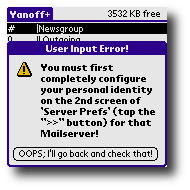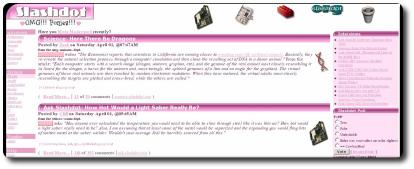 Ever wondered if running a recreational Web site can become a full-time occupation? Ever wondered if bloggers can be paid a wage to blog in favour of a particular company? That it, using the audience as a tool for income? It is a rarity, yet a reality, which more and more people strive to attain.
Ever wondered if running a recreational Web site can become a full-time occupation? Ever wondered if bloggers can be paid a wage to blog in favour of a particular company? That it, using the audience as a tool for income? It is a rarity, yet a reality, which more and more people strive to attain.
I pretty much know what ambitious Webmaster are trying to accomplish with advertisements, but if it is income for life, I would warn them in advance. There are very few Webmasters who, at the moment, can actually boast getting a wage out of advertisements (WebMasterWorld is just one example). However, there is a difference between making ends meet and sustaining an income for life. As with all businesses, the terrain changes and one must change and adopt to to this perpetual change. This change is not intervention(time)-free.
The Web, for instance, is changing all the time and all sites need to evolve. Advertising channels and income sources are running dry even for journalists, in part due to online content, bloggers, and Web 2.0 sites, which are far more fascinating (interactive) than ‘old school’ news sites. And by the way, all my sites combined do not generate more than $30 dollars a month. This is not even enough to cover the hosting bills.
To elaborate on the issue of evolving to facilitate trends, 6 years ago I was using nothing but Windows. I thought my skills were well-invested and bound to endure. Nowadays, I never even lay my hands on Windows and, while I consider this change a tremendous improvement, I just know I would never have managed to do the same things as effectively had I stuck with where I was (a monoculture).
 HY is it that so many user interfaces simply fail to work? It’s because users are permitted to take shortcuts and ignore the instructions. This is in fact the message which is delivered by Jeff Veen, whose opinion was inspired by another’s.
HY is it that so many user interfaces simply fail to work? It’s because users are permitted to take shortcuts and ignore the instructions. This is in fact the message which is delivered by Jeff Veen, whose opinion was inspired by another’s.






 Filed under:
Filed under:  Ever wondered if running a recreational Web site can become a full-time occupation? Ever wondered if bloggers can be
Ever wondered if running a recreational Web site can become a full-time occupation? Ever wondered if bloggers can be  I have just learned (through Bruce Schneier) that, in a large
I have just learned (through Bruce Schneier) that, in a large 
 story/link I had submitted to
story/link I had submitted to 

 was innocently browsing the Internet this morning. By serendipity, I then arrived at a page where Google boast their contributions to Open Source software through funding (
was innocently browsing the Internet this morning. By serendipity, I then arrived at a page where Google boast their contributions to Open Source software through funding ( NCE again, a timely article that covers
NCE again, a timely article that covers